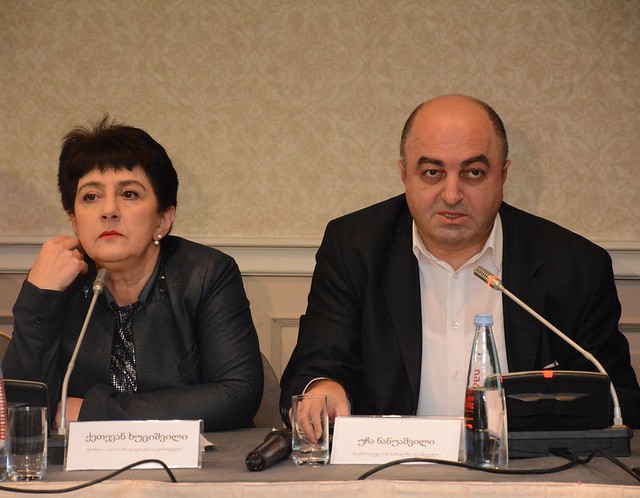Public Defender's Special Study on Situation of Health Rights in Penitentiary System
On December 6, 2017, the Public Defender of Georgia presenteda study prepared by the Special Preventive Group on the situation of health rights in the penitentiary system.
Thestudy, prepared by the financial support of the Open Society Georgia Foundation, includes a survey involving 943 inmates, interviews with medical staff based on a special questionnaire, focus group with representatives of the Ministry of Corrections, examination of medical documentation, processing of official statistical data, analysis of the legislative base and assessment of the medical infrastructure of the institutions.
Themain task of the study was to evaluate the impact of the conditions of penitentiary establishments on prisoners’ health, study the availability of penitentiary healthcare services and establish the level of prisoners' awareness of available services and the degree of satisfaction with these services. The study also aimed to assess the impact of the reforms carried out in the field of penitentiary healthcare since 2013.
The study report praises a number of reforms implemented inthe field of penitentiary healthcare since 2013 that helped to increase the access to penitentiary healthcare services, which is proved by the survey results. The number of inmates who negatively assess penitentiary healthcare services has been significantly reduced. According to the survey conducted in 2013, medical services were negatively evaluated by 72% of respondents, while according to the recent survey, the number of prisoners dissatisfied with the services ranges from 15 to 22%. (The interviewed prisoners separately assessed the services provided in the penitentiary establishments, medical facilities intended for convicts/defendants and civil sector hospitals). 12.5 - 25.7% of respondents assess the services neither positively nor negatively or find it difficult to answer the question, 72,6% of respondents positively evaluate the services provided at the civil sector hospitals, 44.8% positively evaluate the services provided at the medical facilities intended for convicts/defendants and 59.2% positively evaluate the services provided at the penitentiary establishments.
According to thestudy, despite the progress achieved in the direction of penitentiary healthcare, there are still many important problems and challenges in the field, including inadequate screening of somatic and mental diseases, insufficient number and inadequate working conditions of medical personnel (medical staff of penitentiary facilities are in fact in “informational isolation”, which hampers their professional development and affects the quality of services provided), inappropriate periodicity of some doctors’ visits and certain shortcomings in organizing healthcare services.
Based on thestudy results, the Public Defender considers it necessary to make atmosphere in the penitentiary facilities, especially in closed institutions, healthier, establish preventive healthcare model, promote healthy lifestyle, introduce proper psycho-social rehabilitation programs, increase opportunities for prisoners to breath fresh air and be involved in physical activities, and alleviate prison conditions through this means, in order to ensure proper protection of prisoners' health rights. All of the above will facilitate the reduction of the burden of penitentiary healthcare and strengthen the human rights-based management model in the penitentiary system.
Special Study on Situation of Health Rights in Penitentiary System
















